Description:
Within the broader topic of ecologies and framed by the term and concept of hacking, the module's participants discuss their environment and the ways that they engage with entities and systems of power that surround them. Not only the popular meaning of hacking as in "hacking a computer system" is implied, but also to mess about with something in a positive sense, that is, using playful cleverness to achieve a certain goal. Moreover, hacking can manipulate or alienate a system or an object for specific purposes. Thus, Hacking Values can be understood as a method to recognize and understand systems and structures of power.






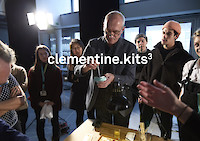
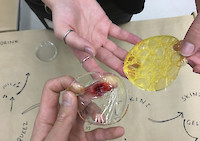

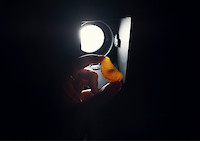


clementine.lab
open source medicine
A project by Mara Weber and Duy Bui
How can materials act as a mediator and as an agent? How can we through DIY medicine and biodesign take care of ourselves? How can we recognise and observe existing structures and systems, learn from them and derive our own interpretation from them?
Clementines and other citrus fruits have a proven influence on enzyme and drug metabolism activity. clementine.lab acknowledges the potential of clementines as drugs and explores their values for DIY medicine. It aims at repurposing leftover clementines and discarded clementine peels and is an open source medicine platform, that distributes clementine.kits as a starting point for your first DIY medicine. It provides no recipes but a frame, to encourage and empower your experimentations with the ingredients.
The clementine.lab platform provides a place where you can explore recipes from and contribute to the community by sharing the recipes you developed.
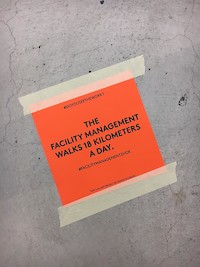
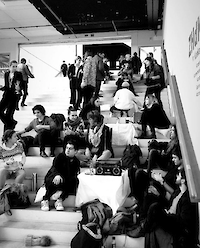
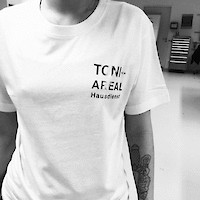
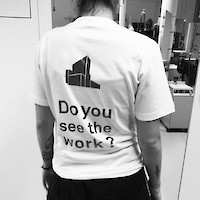
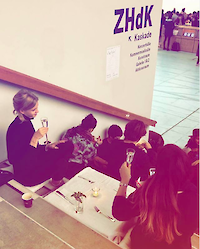
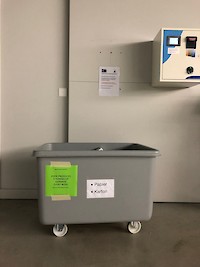
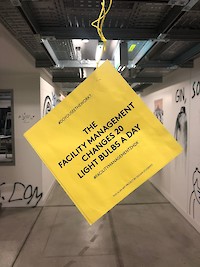
Do you see the work?
Often we are not grateful for things we do not see or take for granted. At Zurich University of the Arts a group of people works at the facility management to make sure that everything runs smoothly and without any problem. Students just see the work done but did they ever see the people behind it?
Do you see the work? is an interdisciplinary project done in the context of Hacking Values. Its aim is to raise awareness around the work done by people who are not always visible and therefore not always gratified for the indispensable tasks they do. As an intervention, the students decided to work with them for a day, in order to have a better understanding of everything they are in charge of. The main goal throuout the project was to highlight these workers and their jobs to the school community, so that they aren't anonymous anymore.
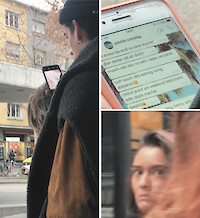
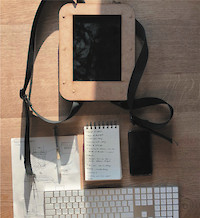
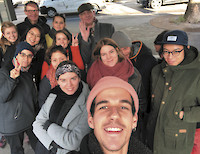
Public Privacy
A project by Rafael Gil Cordeiro, Viviana Laida Leonhardt and Michelle Schmid
The group's aim was to figure out how people value or protect their privacy. In order to do that, they spied on people's phones, took pictures of their screens and started conversations next to them based on the content which was displayed. They received different reactions, some turned around confused and others didn’t even notice. In a second field research, they wanted to get people's opinion, thus they used the content on people's screens to initiate a conversation with them and asked them afterwards if it had bothered them that someone was spying on their phones. Often people reacted indifferently, saying that they were okay with it.
This lead to the question: How would they react if their messages were shown in public, would they still be indifferent about it? Thus the students tried to hack the way people use Whatsapp in public spaces. In order to achieve that they built a backpack for the iPad. The iPad was connected to their personal phone and located on their backs, so that everyone could see at any time what or with whom they were chatting. Furthermore, people could join the conversation and write something into the iPad. The reactions were quite astonishing. Some people observed the chat from afar, others took pictures, but very fast and trying to hide it. One man took a picture and approached the student afterwards, asking if she was aware that one could read her private chat. In fact, that happened several times. In an other case, a group of teenagers stood in front of the iPad and we could hear their discussion about whether they had the right to read the messages or not. Thus, one girl argued they shouldn’t read it because of privacy. Some people were curious and started to talk to us about privacy. Others asked if that was a new trend and yet others tried to join the conversation on screen and started typing.
Our main goal was to create awareness around the topic of privacy. How do you value your privacy and is Whatsapp the right medium for having a private conversation?
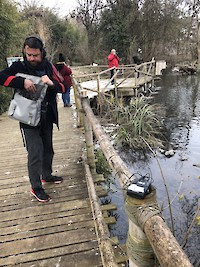
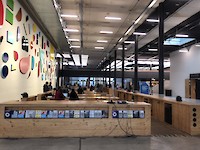
RELOCATION
A project by Fangztong Xu, Robi Voigt and Tim Goossens
Relocation hacked the soundscape of places by playing recordings from different locations (e.g. the zoo, the train station, the main hall of Zurich University of the Arts) or from the same locations but at another time of the day. The most remarkable moment was when they would stop the recording and people started to notice that they'd just been acoustically "hacked".



